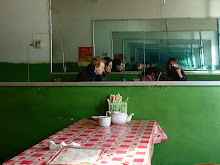
Photo by Zsolt Bugarski, available under a Creative Commons Attribution-Noncommercial license.
Whilst translating Jack's last Soy Sauce entry I encountered many words and phrases that were unfamiliar to me. Perhaps I had never encountered them before or maybe I had just forgotten, whatever the reason I would like to spend some time writing about some of the language elements that sent me scrambling for my dictionary. And this is just the first paragraph! I find translation almost endlessly fascinating.
1) I never had a decent part time job in China.
在国内的时候,我没有做过像样的兼职。
像样 This adjective can be translated as decent, presentable or sound, conveying the idea that the noun being described is nothing to be ashamed of. In this sentence Jack uses it to describe part time work - 像样的兼职。 It could also be used to describe a decent meal 像样的饭菜 furniture 像样的家具 or even a suit 像样的套装。Interestingly enough you could also use it in the same way English speakers say make yourself presentable. For example, the sentence - Make yourself presentable for the interview, could be rendered as 面谈时收拾得像样点儿。
2) When I had time I mostly squandered it having fun.
有时间都浪费在玩儿上面
浪费 is a verb meaning to waste or squander. As a noun, the character 浪 means a wave, 巨浪 meaning mountainous wave. As a verb this character takes on the very wave like meaning of being unrestrained, hence its ability to convey the meaning of squandering time by having fun 浪费在玩儿上面。 One could also waste one's money 浪费金钱, words 浪费口舌 or even one's youth 浪费青春. Interestingly, 浪 also appears in 浪漫, meaning romantic. Here both characters convey a sense of something that cannot be contained, an overflowing of emotion made even more poetic by the presence of the water radical in both characters.
3) To be honest I haven't been that considerate of my parents.
说实话,我不是一个能体谅父母的人。
体谅 is a verb meaning to be considerate or to show sympathetic understanding of. When describing the character of a person or place in Chinese it seems quite common to use the pattern 我是/不是一个能做某事的人 meaning literally I am a person who can/cannot do something. I don't know why but this kind of pattern reminds me of a song lyric by the Beijing band Car Sick Cars called Square where singer Shou Wang sings 这是一个没有希望的广场, this is a (public/town) square without hope.
4) However since arriving in Australia, I have begun to appreciate the hardships associated with earning money.
不过来澳洲, 我能感到赚钱的艰辛。
赚钱 is a verb meaning to earn money. 艰辛 is a noun meaning difficulties and hardships, the first character also appearing in the more commonly heard 艰难。Last semester I also remember coming across the character whilst reading the words of the famous Chinese author 胡适. He used the word 艰深 meaning abstruse as a way to describe theories 艰深概念 that by right should be critically analyzed in order to discover their true worth to society in his essay 新思潮的意义, commonly translated as 'The meaning of New Thought'。 As a way of wrapping this post up you might notice that the title of the essay employs the character 潮 which literally means tide. However, 潮 here is used figuratively to describe a social upsurge, in this case the influx of western ideas in China during the early 20th century. So we can have a wave of refugees 难民潮 and, going back to our earlier character 浪 we can describe a tidal wave of reform - 改革的浪潮。










